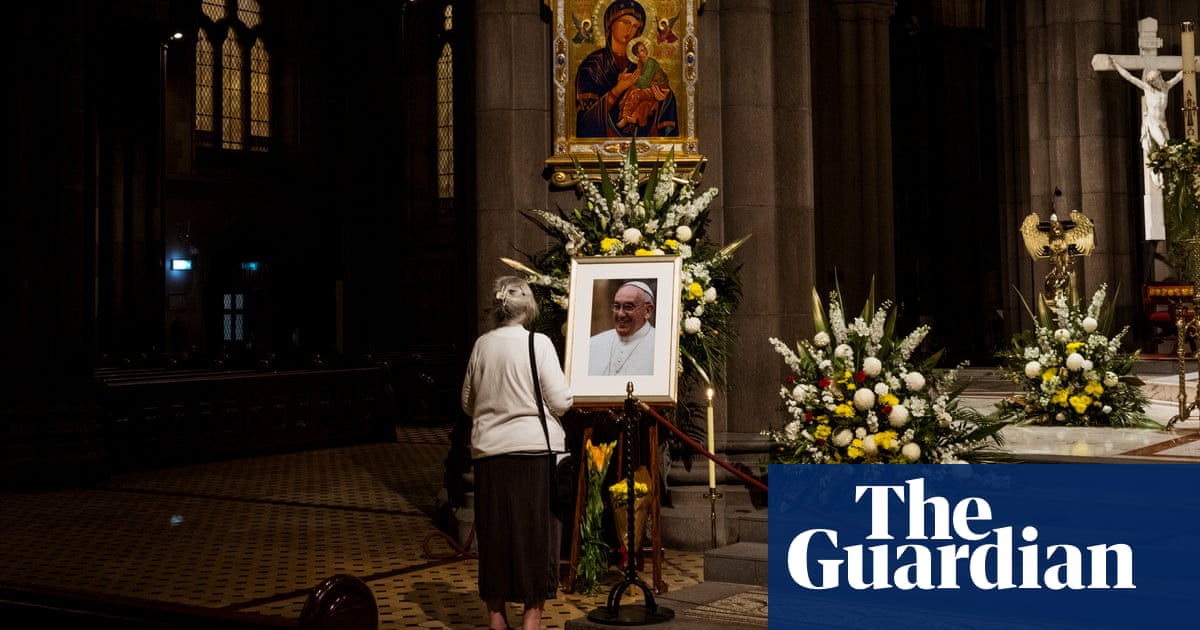As Armina Pines lit a candle inside Melbourne’s St Patrick’s Cathedral, the jovial smile of the latePope Francisbeamed from a portrait on the wall.
For Pines, Pope Francis embodiedhis legacy as the people’s pope.The pontiff, who reshaped the Catholic church to be more inclusive, helped her feel embraced by the institution as a gay woman, Pines said.
“He’s just a very special pope to us. He’s the most welcoming one,” she said. “Me and my partner, we thought the church was a difficult place to go to, but the pope made us feel welcome.”
Sign up for the Afternoon Update: Election 2025 email newsletter
Visiting from Sydney, Pines and her partner lit candles on Tuesday morning as worshippers trickled through to pay their respects toFrancis, 88, who died on Monday.
Earlier, under Melbourne’s drizzly skies, the prime minister,Anthony Albanese, returned to the cathedral he visited briefly on Monday evening for its 7am mass.
Seated in the front row, Albanese was among about 50 mourners scattered in the cathedral’s pews.
Monsignor Stuart Hall, the dean of St Patrick’s Cathedral, told mourners the “beloved” Pope Francis called out to a range of voices, including the dispossessed.
On the cathedral’s steps, Alice D’Cruz welcomed Albanese choosing to attend the service and join mourners praying for the pope. “It shows his humbleness. He came to offer his grief,” she said.
“Although you’re on a pedestal, you’ve got to come down to be a normal human being to pray for the head of the Catholic church.”
Peter August, who attends 7am mass each weekday, said there was “a lot of love being shown” in the global reaction to Francis’ death.
“He engendered a lot of affection from a lot of people around the world. I just hope the next pope can do the same.”
At St Mary’s cathedral in Sydney, the home affairs minister, Tony Burke, joined a crowd at the 6:45am Easter Tuesday mass.
The Archbishop of Sydney, Anthony Fisher, remarked on the timing of Francis’ death – a day after blessing thousands of peoplegathered for mass in St Peter’s Squarein Vatican City.
“That we got to Easter, that we had him that last extra bit, I think there is a great gratitude,” he said.
Francis made only a handful of public appearances after leaving hospital and returning to the Vatican on 23 March.
Sign up toAfternoon Update: Election 2025
Our Australian afternoon update breaks down the key election campaign stories of the day, telling you what’s happening and why it matters
after newsletter promotion
The driving values behind Pope Francis’s leadership mirrored those of his namesake, Saint Francis of Assisi, “a man of the poor and a man of the environment”, Fisher said.
“We heard him many times talking about the need for the church to go out to the peripheries, to the people who feel alienated, people who are financially poor or emotionally poor,” he said.
“And our passion for our common home, the Earth, that we look after, this world that we’ve been given, that we leave it as good or better than we received for the next generations.”
Fisher described a “hushed quiet” inside the cathedral on Tuesday morning – a different atmosphere to the usual joy and excitement that follows Easter.
Francis was a vocal championof the world’s poor, dispossessed and disadvantaged and a blunt critic of corporate greed and social and economic inequality. Within the Vatican, he criticised extravagance and privilege, calling on church leaders to show humility.
Weeks out from the federal election, it was a morning for prayer and remembrance, with both Albanese and Dutton cancelling campaign events as a mark of respect. Albanese on Monday said he had ordered commonwealth flags to be flown at half-mast on Tuesday.
On Monday the prime ministerpaid tribute to Francis, describing him as a “devoted champion and a loving father”.
In Sydney, parishioner Steeven described the loss of the pope as “a very sad feeling”.
“The holy father, as I’ve known him, he’s been one of the nicest people on Earth. He stood for love and peace.”
Sinisita, another parishioner, said she was “so grateful that we had him”.
“I love this pope. He was my pope.”
